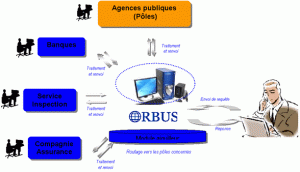SENEGAL – GAINDE 2000
 |
Manager
Ibrahima Nour Eddine DIAGNE
GAINDE Managing Director
UN/CEFACT Rapporteur for Africa
Ibrahima Nour Eddine DIAGNE holds a MBA, a M.Sc and a B.Sc in Marketing (HEC Montréal, HEC Paris). He has, since 1995, been active in all issues relative to trade facilitation through NICT worldwide, whence its appointment as UNCEFACT Rapporteur for Africa in 2006.
Historique
The ORBUS System has been powered to facilitate foreign trade formalities through electronic exchanges among different stakeholders. Built on a technological infrastructure and a set of services, ORBUS has led to a significant reduction of the pre-clearance time and formalities-related costs, an improved quality of the service offered to clients, and the almost elimination of paperwork.
The main motivation that had culminated in its creation was to facilitate, inter alia:
- Closer relations among foreign trade stakeholders;
- Improved working conditions;
- Simplification and harmonisation of procedures;
- Reduction of costs and time;
- Introduction of new technologies in the administration and trade circles.
Services
Facilitation Centre
The Facilitation Centre has been set up to assure the system’s back office management, but also to address the needs of the users who do not have online access to the system. Data capture operators create ORBUS files on the latter’s behalf and monitor the state of progress.
Help Desk
Users having pending files have the right to use the services of the Help Desk for the following aspects:
- General information on ORBUS procedures ;
- Data capture assistance ;
- Technical assistance;
- Online resolution of hitches ;
- Monitoring of files ;
- Reporting of hitches or belated processing;
- Any other information or assistance related to the running and use of the ORBUS System.
To meet users’ demands, the Facilitation Centre puts at their disposal:
- A Call Centre open Monday through Friday from 8h30 to 17h30
- A user space in the Web site www.gainde2000.sn
Training
Training sessions are intended for ORBUS users and aimed at making them perfectly understand and use the system, from file creation to the collection of issued documents. Moreover, some selective training sessions can also be staged on demand.
The Facilitation Centre also stages upgrading sessions in the form of seminars. The latter are generally held every 6 months.
Présentation
The ORBUS solution is made up of different interconnected modules that make it possible to ensure fluidity and swiftness in the processing of operations.
Request transmission module
An interface is reserved for the importer whereby he can send a request to all the administrative structures (stakeholders)* connected to the system. He captures the invoice data and the system proposes electronic documents required for the operation. By validating the system-proposed documents, his request is automatically sent to all the stakeholders involved in the operation. Once the requests are processed, the importer receives all the documents on his screen, with the possibility to print or send them electronically to customs. The importer can monitor in real time the flow of all these transactions.
* Any administrative, public or private, body involved in the import/export process for the issuance of a given document.
Switch
The module represents the heart of the system. It integrates all the import/export management rules. Depending on the data captures by the client, it analyses the documents required for the operation and proposes them to the client. When the latter validates, the switch module transmits the data and attached documents to the stakeholders concerned. Each stakeholder only receives the data destined to it. Thus, there is no abusive diffusion of data and confidentiality of the data is respected. This module can be parameterized according to the regulations in force.
Stakeholder module
This interface is reserved for the stakeholders connected to the system. It enables the latter to receive and process importers’ requests. It is fitted with several processing functions whereby the processing officers can validate the requests, ask for modifications or simply reject the applications. Several users can be identified in a given administrative body and through the module; it is possible to attribute a specific function to each of them. The profiles are managed in-house. This module is available in WEB and Client version. Thus, it can be deployed in both versions depending on the client’s concerns.
Monitoring module
It enables the entity running the platform to have an overview of the system’s performances. It serves as a support for the Help Desk, the operators of which can at any time trace a given file and thus activate its processing. It is also a tool aimed at improving the performances through the monitoring of the transactions and the integration of performance indicators. It is crucial to assure a proper running of the system.
Management modules
These modules facilitate the running of the system. They include the subscription module, the invoicing module, the printout module and the receipt remission module. They facilitate an efficient exploitation of the platform.
Functional Description
